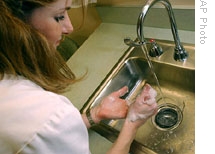VOA慢速英语-Health Report - Hand Washing by Birth Attendants, Mo
搜索关注在线英语听力室公众号:tingroom,领取免费英语资料大礼包。
(单词翻译)
A study in rural Nepal found a greater chance that babies would survive their first month. Transcript1 of radio broadcast:
08 July 2008
This is the VOA Special English Health Report.
A new study in rural Nepal shows the value of washing hands with soap and water in preparation for childbirth. Researchers found that hand washing by birth attendants2 and mothers increased the chances that babies would survive their first month.
 |
| A nurse washes her hands before entering a patient's room. The simple act of washing hands can prevent the spread of disease. |
The study showed that the risk of death was nineteen percent lower when birth attendants washed their hands before delivery. And the risk of death was forty-four percent lower when mothers washed their hands before they touched their baby.
Researchers from the Johns Hopkins Bloomberg School of Public Health in the United States did the study. They observed more than twenty-three thousand newborns. Almost all were born at home or on the way to a medical center.
The study says just fifty-three percent of birth attendants reported washing their hands with soap and water before delivery. And only fifteen percent of mothers reported washing their hands before handling their newborn.
More than thirty-thousand newborns die each year in Nepal. Researcher James Tielsch says the findings suggest that hand washing could prevent many of these deaths.
The Bloomberg professor noted3 that several studies have shown that a mother's hand washing can reduce the risk of diarrhea in young children. But he says this was one of the first to examine the effects of hand washing on the first month after birth.
The findings appear in July's Archives of Pediatric and Adolescent Medicine.
Hand washing can prevent the spread of many infections. Hand washing is especially important before and after preparing food, before eating and after using the toilet. People should wash their hands after cleaning a baby and after handling animals or animal waste.
Hand washing is also a good idea after handling money and after sneezing or coughing. And wash hands often when someone at home is sick.
Experts say the most effective way to wash is to rub the hands together while using soap and warm water. They say you do not need special antibacterial soap. Be sure to rub all areas of the hands for about ten to fifteen seconds. The rubbing action helps remove germs. Then rinse4 the hands with clean water and dry them.
Alcohol-based hand sanitizers are rubbed into the hands and do not require soap and water. Experts say these products must contain at least sixty percent alcohol to be effective. Professor Tielsch says hand sanitizers are OK for mothers to use but should not be used on babies' skin.
And that's the VOA Special English Health Report. I'm Doug Johnson.
 收听单词发音
收听单词发音 




